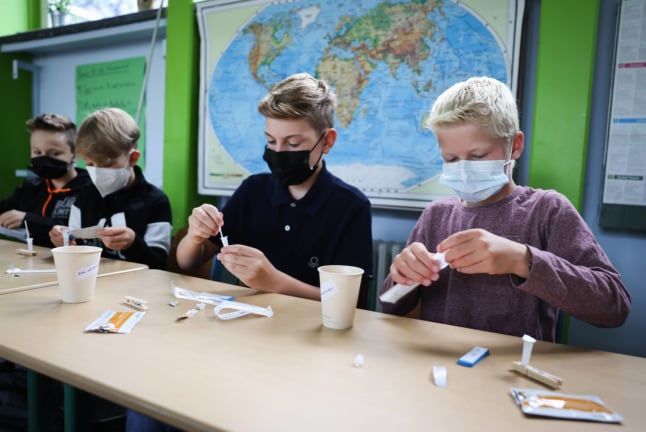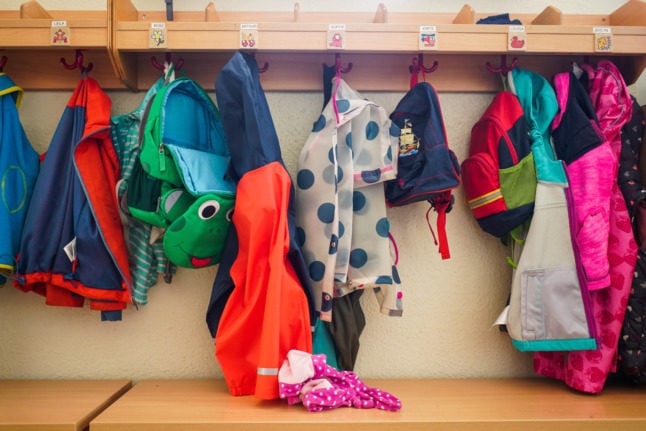The frequency of Covid outbreaks is on the rise this year about two months earlier than in 2020, Germany’s public health authority the Robert Koch Institute (RKI) revealed this week.
According to a report released Thursday, 201 nursery and 481 school outbreaks were recorded within the first four weeks of the new school term.
“Expanded testing activities and easier transmission of the Delta variant are likely playing a role in the increased frequency of outbreaks in nurseries and schools,” the authors of the report wrote.
According to current statistics, an average of five people per outbreak are infected at nurseries and four at schools. Occasionally, however, there are larger outbreaks with more than 10 infections at both types of facilities.
An ‘outbreak’ is defined as the infection of two or more people with Covid at any facility.
READ ALSO: Hamburg says Covid masks must continue in schools after ‘superspreader’ investigation
In the school outbreaks, infections are most common among children aged 6-14. Last week, the 10-14 year old age group had the highest 7-day incidence nationwide, with 178 new infections per 100,000 people within a week.
Among children of primary school age (5-9), the 7-day incidence of Covid infections per 100,000 people was 142. Among people aged 50 and older, meanwhile, incidences were lower than 50.
The most recent Covid trends – especially based on data from the past two weeks – haven’t yet been analysed and will likely be used in follow-up reports, the RKI explained.
Following a meeting of the state education ministers, the president of the education ministers’ conference, said she was unsurprised at the data showing an increase in outbreaks among young people.
“We knew that the incidences would be higher in children and adolescents compared to adults because we have a later vaccination recommendation or no vaccination recommendation at all for children under 12 years old and also no vaccine,” said Britta Ernst (SPD).
‘Please maintain protective measures’
In a press conference held alongside Health Minister Jens Spahn (CDU) on Wednesday, RKI chair Lothar Wieler reiterated the importance of maintain strict hygeine regulations to combat the spread of the highly infectious Delta variant.
Infection control measures in schools and childcare centres- as well as in retirement and nursing homes – should be maintained until spring 2022, he said.
Over the past week or so, several states – most recently North Rhine-Westphalia, and before that Berlin, Bavaria and Brandenburg – have opted to drop the mask-wearing requirement in schools.

Children at the Goethe Gymnasium in Hamburg take Covid rapid tests in the classroom. Photo: picture alliance/dpa | Christian Charisius
The move has prompted a fierce debate among teachers, parents and health experts.
“It’s completely unreasonable that children and adolescents have to wear a mask for hours in class, while adults can go to the pub in the evening without a mask,” Klaus Reinhardt, the president of the German Medical Association, previously told Redaktionsnetzwerk Deutschland.
READ ALSO: German experts divided over state plans to relax Covid mask rules in schools
But RKI chief Wieler emphasised on Wednesday that measures like mask-wearing would remain crucial for protecting young people – many of whom are unable to get vaccinated.
“We want nurseries and schools to stay open, but please maintain protective measures,” Wieler said.
This view was shared by Ernst, who following the education ministers’ conference in Potsdam reiterated the need for Covid measures such as masks and testing in schools.
“The decision is not to now drop all protection concepts from one day to the next,” she said. “I very much hope that at some point we will no longer need these measures.”
Though severe courses of Covid are rare in young people, the RKI also noted that long-term consequences of the infection on children had not yet been fully determined.
“We’re still of the opinion that children need protecting,” Wieler said. “That includes everyone who can, who interacts with children, getting vaccinated against Covid-19 and also complying with the other measures.”
In contrast to the situation in schools and Kitas, homes for the elderly are seeing a decline in the number of Covid outbreaks, with around 50 recorded within four weeks. This is due to the high level of vaccination coverage among over-60s and the effectiveness of hygiene measures, the RKI revealed.



 Please whitelist us to continue reading.
Please whitelist us to continue reading.
Member comments